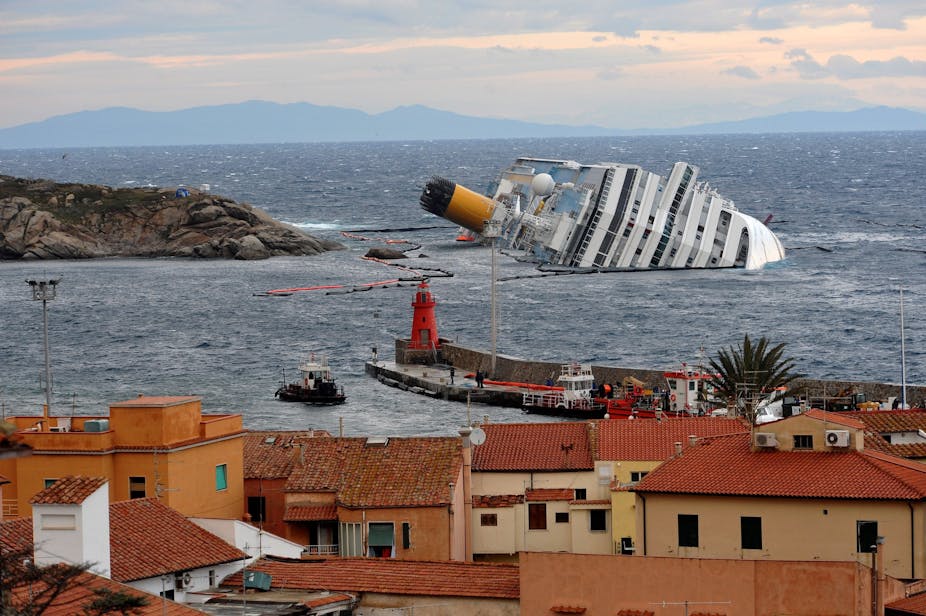Late last week, an Italian court sentenced the captain of the Costa Concordia cruise liner, Francesco Schettino, to 16 years’ jail after finding him guilty of multiple charges of manslaughter.
On January 13, 2012, the ship ran aground and keeled over off the coast of the island of Giglio, Italy. Thirty-two people drowned.
Twenty-eight years ago, on March 6, 1987, the passenger car ferry Herald of Free Enterprise left the Belgian port of Zeebrugge, bound for Dover. Tragically, her bow doors remained open and she keeled over, trapping and drowning 188 passengers.
In June 1989, seven individuals and their employer, P&O European Ferries, were charged with what is referred to as “corporate manslaughter”. But a year later the English judge dismissed the charges, having become satisfied that the prosecution had failed to establish its case.
Why was there a difference in the outcomes of these two cases? Generally speaking, a prosecutor seeking to get a conviction in such circumstances must be able to single out the culpable decision-making of someone who represents the “guiding mind” of a company. Where many people participate in poor decision-making, it is extremely difficult to establish guilt. On this point there is no significant difference in international legal approaches.
Simply stated, Schettino was an easily identified culprit. He made the fateful decision to divert his ship closer to Giglio than was safe. It didn’t help that he abandoned ship ahead of hundreds of his passengers.
In contrast, the criminal negligence of the crew of the Herald of Free Enterprise was shared around. It was impossible to find a “guiding mind”. The prosecution was doomed from the start.
Shouldn’t there be some way that the law could fill this loophole so that appropriate criminal responsibility can be assigned to those who deserve it? The answer is yes, but the path towards “joint” or corporate criminal liability is paved with stumbling blocks. As legal academics Jim Gobert and Maurice Punch explain:
… criminal law was not developed with companies in mind … Trying to apply [it] to companies is a bit like trying to squeeze a square peg into a round hole.
What is the state of the law in Australia?
Let me give an Australian example that illustrates the legal difficulties. Excalibur, a 15-metre racing vessel built by Applied Alloy Yachts, a company owned by an Alex Cittadini, capsized off Port Stephens in September 2002 after its keel snapped in high winds. Four of the six crew drowned.

In April 2009, four manslaughter convictions were returned against Cittadini – notwithstanding Judge Norrish accepting his evidence that he was unaware of the cut. The judge ruled that even if Cittadini did not know about the cutting of the keel, he should have known about it. He sentenced Cittadini to three years jail.
However, the NSW Court of Criminal Appeal subsequently quashed the convictions and directed verdicts of acquittal, determining that the verdict was “unreasonable”. A survivor of the Excalibur tragedy, Brian McDermott, later expressed deep disappointment that no-one had been held accountable for the deaths.
In 1995, the federal parliament had decided to up the ante and passed into law Part 2 of the Commonwealth Criminal Code Act, which expands the notion of criminal liability to corporations in a most innovative way. Under this legislation, a company can be convicted of manslaughter where the negligence involved is attributable to more than one person. The “guiding mind” can be an aggregation of minds.
In addition, the code allows culpability to be established by reference to a company’s poor “corporate culture”. That is, a company can be deemed criminally liable for a death if it has a culture that actively or even passively permits or tolerates non-compliance with the law. Imprisonment of managers may result.
Commonwealth law has a catch
Why didn’t this law apply to Cittadini? Because there is a catch: the code applies only to Commonwealth offences, and manslaughter is not a Commonwealth offence. In order to give effect to the code’s lead, the states and territories need to adopt its provisions.
To date, the Australian Capital Territory is the only jurisdiction that has chosen to do so, but its legislation applies only to deaths in the workplace. The English law has changed in some similar respects. Also, the law came into effect in 2004, yet there have been no prosecutions to date that the author is aware of.
This prompts the question whether there is any value in singling out corporate directors for punishment solely by virtue of their status within a delinquent company. Is it not too arbitrary to allow one officer to take the blame for the tragic consequences of a chain of bad decisions? Where is the evidence that imprisonment of key managers will act as a deterrent?
Be that as it may, there is no doubt that many if not all of the families of the 32 victims of Schettino’s stupidity will get some satisfaction from the knowledge that he will now spend a considerable period of time behind bars.

